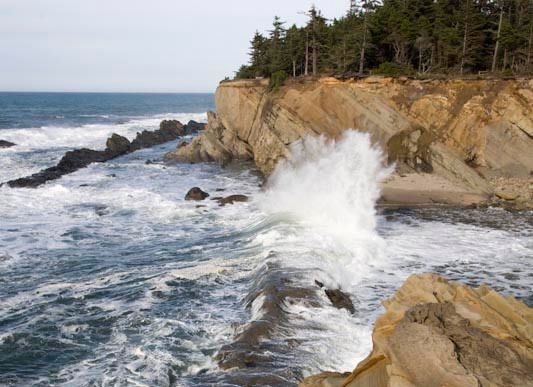Scientific and Historical Invisibility: How the Unknown Changes the Known
It's obvious to say that if we don't have evidence of something, it's hard to know anything about it. The effects of missing evidence on science and history, however, is more significant than merely not knowing something.
Take dinosaurs, for example. Almost all dinosaur fossils we have are of lowland dinosaurs. We have few to no highland dinosaurs. They're almost entirely absent from the record. This is due to the way geology functions. There are two major types of continental geological activity- upwards and downwards. This is reductive, but it works for our purposes. Upwards activity includes mountain building events (orogenies), volcanic activity, etc. Downward activity is most prominent in the formation of river deltas, where the land is continually sinking and being covered up with more river sediment. The slightly counterintuitive difference in preservation between the two? Downward activity can produce fossils, while upward cannot.
The reason that only the geological 'down escalator' can produce fossils is because while it is sinking, it is also depositing sediment. A creature dies, sinks into the mud, and then more sediment is deposited atop them, keeping oxygen out and preserving the creature to eventually become a fossil as the mud around them slowly turns to stone. The upward escalator, however, is actually eroding at all times. When it's highly active, it grows much faster than it weathers and erodes, but it is still eroding- there's no deposition that can occur at the top.
Due to that, the overwhelming majority of dinosaurs we know are lowland dinosaurs. This very much distorts the way we think of dinosaurs. Lowland dinosaurs are, for example, probably less likely to need elaborate water retention mechanisms than highland dinosaurs, since deserts are a little bit more common in highlands. Lowland dinosaurs are also likely to be larger on average than highland dinosaurs, since lowland biospheres tend to be richer than highland ones. It's hard to say for sure because we lack the evidence. We can only really make inferences about the highland dinosaurs. Only knowing lowland dinosaurs is like if we had only ever seen, say, Great Danes and not Chihuahuas. We would have a very, very distorted idea of dogs- not only their size, but their behavior, lifespan, medical issues, etc.
This doesn't just apply to paleontology. It also applies to geology in general. Plenty of erosive geological processes often don't leave any rocks of their own- they do, however, leave behind evidence. An unconformity is a spot where rock deposition occured, halted and was replaced by weathering and erosion, which in turn was once again replaced by deposition. They're often quite visually distinctive, even to the untrained eye. Unconformities are considerably less common, however, than regions where the geological strata simply never resumed deposition, and just kept eroding. One of the challenges throughout geology is trying to piece together the missing parts of the puzzle, and it's definitely not easy.

An angular unconformity at Shore Acres State Park, Oregon. Note the angular rock layers abruptly stop and are covered by a flat layer. This is also a marine terrace, part of the geologic "up escalator". [Image source]
This isn't exclusive to geology or even the hard sciences by any means. It's also present in the historical sciences. We are, for example, able to know much more about a society that leaves translatable writings behind than an illiterate society. We're much more likely to know more about a civilization of monument builders like the Egyptians than we are about a nomadic people like the Huns. We only really know the Huns from the writing of their enemies, the Romans. We suspect they originated in Mongolia or Western China, were driven out, and eventually arrived in Europe centuries later, but we have little idea what happened during those in between centuries. Our view of history is very much distorted by what was written down and by whom.
![]()
A medieval illustration of Huns besieging a city. Importantly, it's absolutely filled with anachronisms, like the use of medieval European arms and armour. [Image source]
There were many nomadic tribes throughout history that have conquered settled regions. More often than not, though, they weren't the ones who wrote history- their new subjects were. And as often as not, the conquering nomads were treated pretty badly in the histories of their conquered people. The old saying "History is written by the victors" is, to a great extent, wrong. History is written by the literate.
The writing material chosen by literate societies is critically important. The ancient kingdoms of India usually wrote things down on manuscripts fashioned from palm leaves. It made a great material for them to work on, but unfortunately for us, they preserve quite poorly. Past a certain age, we simply don't have any of them left. This makes the pursuit of ancient Indian history more difficult than that of ancient Chinese or Egyptian history.
Most of the examples discussed so far have been the results of events in the past. There's a second form of invisibility that needs to be addressed as well- that caused by our choices and ideologies today. If no historian is interested in a topic, it becomes invisible to history. If the prevailing theory within a discipline says that a particular process is impossible, evidence of that process is likely to be ignored and dismissed. If a narrative claims that things happen in this specific manner, attention is often focused on evidence that reinforces the narrative, ignoring counter-evidence.
The problems of scientific and historical invisibility are a constant in all disciplines that study the past. To keep from distorting our view of the past, we must first know our biases. Then we must use the existing evidence to make inferences about the unknowns.
Lao-Tzu phrased it best:
"Therefore just as we take advantage of what is, we should recognize the usefulness of what is not."
-Tao Te Ching, chapter 10
Bibliography:
China: A History, by John Keay
India: A History, by John Keay
The Earth After Us: What Legacy Will Humans Leave in the Rocks?, by Jan Zalasiewicz

You've received a FULL upvote from #TheUnmentionables - a SteemIt community full of members who like to kick ass, take names, and occasionally do it wearing (or forgetting to wear) our unmentionables...
Click the Image to Join Our Discord Server:
Please upvote this comment so we can help our members grow faster!
@originalworks
The @OriginalWorks bot has determined this post by @mountainwashere to be original material and upvoted it!
To call @OriginalWorks, simply reply to any post with @originalworks or !originalworks in your message!
To nominate this post for the daily RESTEEM contest, upvote this comment! The user with the most upvotes on their @OriginalWorks comment will win!
For more information, Click Here!
This was very interesting!
I'm glad you think so!
This post recieved an upvote from minnowpond. If you would like to recieve upvotes from minnowpond on all your posts, simply FOLLOW @minnowpond
This post has received a 1.13 % upvote from @booster thanks to: @mountainwashere.
Oh, neat! I'm going to have to start using that tag!
Congratulations @mountainwashere, this post is the fifth most rewarded post (based on pending payouts) in the last 12 hours written by a User account holder (accounts that hold between 0.1 and 1.0 Mega Vests). The total number of posts by User account holders during this period was 1031 and the total pending payments to posts in this category was $1690.46. To see the full list of highest paid posts across all accounts categories, click here.
If you do not wish to receive these messages in future, please reply stop to this comment.
This post recieved an upvote from minnowpond. If you would like to recieve upvotes from minnowpond on all your posts, simply FOLLOW @minnowpond
Really interesting read @mountainwashere, it always get's kinda tricky when you start getting biases but I think your philosophy is good. Look at the evidence, recognize your biases and make the most sound inference from there.
@mountainwashere got you a $1.5 @minnowbooster upgoat, nice! (Image: pixabay.com)
Want a boost? Click here to read more!